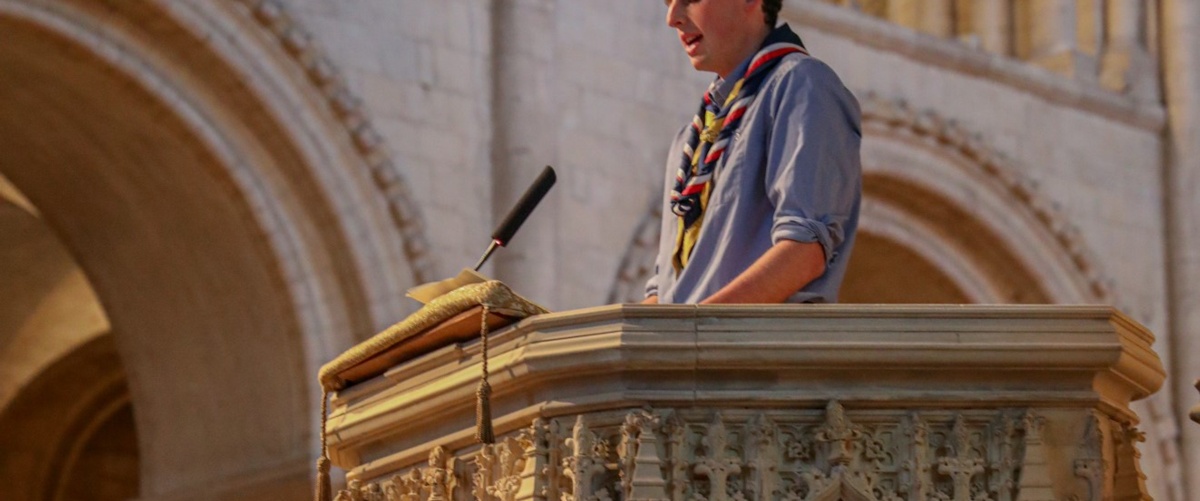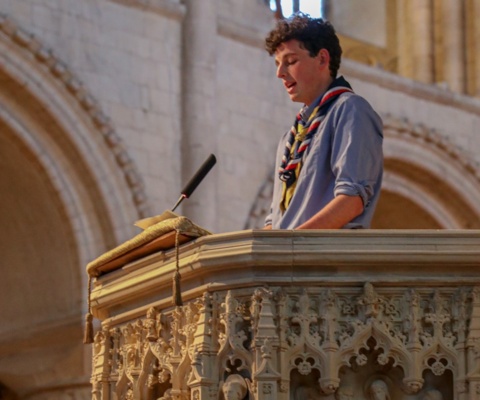The entire school gathered in the Cathedral on the last day of term to remember our most famous ON, Horatio Nelson, at the annual Trafalgar Day Service.
George Schofield, member of the 8th Norwich Sea Scouts, gave this address:
"The celebration of the Battle of Trafalgar today allows us to come together and reflect on two key things: leadership and community. On the 21st October 1805, over 52 000 Royal Naval men launched upon the Spanish and French navies, led by two men, Vice Admiral Viscount Nelson, and the lesser known but just as admirable, Vice Admiral Sir Cuthbert Collingwood, who took over after Nelson’s death. Collingwood and his fleet showed exceptional bravery and courage in the following days. Nelson had intended before his death that the British fleet should be anchored to withstand the coming storm, but Collingwood knew some ships would not survive the storm at anchor and instead took the damaged ships under tow, risking his life and many of his men. A bold and dangerous action but Collingwood showed unfaltering respect for his men and tried to give as many of them a chance of survival as possible in return for their sacrifice. Nelson, although embroiled in inexcusable actions towards his wife, not only proved himself an expert tactician in battle but also strived to treat his men with respect. Nelson was a strict enforcer of the naval rule that every man aboard his ship must be paid and treated just as any other member of the crew. He also made sure all men, regardless of race or background were discharged free men. This, to me, is important as it shows respect. Respect is essential for a functioning society, it allows people to feel safe and comfortable expressing their views, not only between people and elders, but also between peers.
The Royal Navy that was present at Trafalgar is the same navy as today. On the surface this may seem obvious, but it holds a meaningful message. The Navy aims to ‘stabilise the seas, keeping the maritime trade that is the lifeblood of the UK economy flowing. It acts as a guardian and a diplomat, as a humanitarian force for good, and a peacekeeper on the global stage.’ These aims show an underlying effort to support diversity, tolerance, and equality. These are things that we should strive for in the present day. It is important that we think of this during our commemoration today, to remind us of important values we should uphold and practise.
On this Trafalgar Day I want you to think about importance of remembering the communities involved, as there is a much greater picture to the battle of Trafalgar that is often forgotten. Firstly, Trafalgar was a pivotal day at the pinnacle of 12 years of the Napoleonic wars. Over 5 000 000 men were involved in this 12-year conflict. I implore you today to remember them, those who went to sea and gave their lives and did not return, just like other members of the Norwich School and 8th Norwich Sea Scout communities that are sadly no longer with us.
This Trafalgar I ask you to think about the wider battle: the battle for leadership and community. From the enforcement of equality on board ships by Nelson and the respect Collingwood upheld with his men, right through to those who fought aboard ships to free the world and make the it a better place. I ask you to think about how this can affect you, be it in friendship groups when someone says something they shouldn’t, or something in the wider community that you believe is wrong. I urge you to go out every day and fight for what you believe in, just like Nelson and his men."
School Prefect Ann Kalu gave this address:
"Before I came to Norwich School, I had never heard of Trafalgar Day, and barely knew who Nelson was. I’ve learnt more and more about him over the past six years, and the way I have approached his remembrance has changed throughout. In recent times, following the resurgence of the Black Lives Matter movement in 2020, we, as a school, have explored the history surrounding Nelson. But with this assembly probably being the last Trafalgar Day service I will attend, I will spend it reflecting on the dynamic nature of leadership.
Since Nelson’s time, so many different forms of leadership have evolved, and the diversity of such leadership is especially obvious in school. From being a first team rugby captain, or a prefect, to leading a group project in class, or simply being an up-stander amongst peers, I am sure that everyone here today has been a leader before – even if it is not an obvious leadership role. You can research and name many historical, religious and modern leaders, from countries, religions and cultures across the world, and they are all united by one thing: the coexistence of their leadership and their service. Similarly, one of the aims this school has for us all is that when we walk out of the Close for the last time, we are prepared for a life of leadership and service. For some of you, you will not leave school for a few more years, but for us U6, we only have a few more months.
Though entirely admirable, Nelson’s military leadership has felt completely detached from my life, very far from any form of leadership I would be able to undertake. But as I have gotten older and taken on more responsibilities within and beyond school, the adaptability of his leadership has become more obvious to me. I doubt many of us will become as great a military leader as Nelson, but this does not mean there is nothing we can learn from him. As George mentioned, the way he fought for equality and what he believed in is one of many traits of his that we can be inspired by this Trafalgar day.
Another person we can remember when thinking about leadership and service is our late Queen. Though her leadership was quite different in many respects to Nelson, her commitment to her country was unquestionable. On her 21st birthday, she gave a speech, promising to dedicate her life to the leadership and service of this country, and it is unarguable that she went above and beyond in her duty to fulfil this promise, even into the last days of her life.
As we heard yesterday from Alex and members of our BAME society, we are coming to the end of the UK’s Black History Month. So to finish, I would like to speak about Stormzy. Many of you, I hope, will know who Stormzy is, and will be aware of his social activism and how he constantly uplifts fellow artists and celebrities.
Recently he released a music video for his new song “MEL MADE ME DO IT”, from his upcoming album. The main talking point of the star-studded video was the proud exhibition of Black British talent and innovation, with both older and more contemporary stars being featured. Some of the most recognisable figures featured include Dina Asher-Smith, the fastest British woman on record; Little Simz, who won the 2022 Mercury Prize on Tuesday for her album Sometimes I might be Introvert; Malorie Blackman, an award-winning Children’s Laureate and recipient of an OBE; and Ian Wright, former professional footballer, now a well-loved and well-known TV and radio personality.
All those in the video were leaders across all facets of culture, and I think there is bound to be someone in the video whose impact in their respective field you can appreciate. Because of the talent, leadership and service of them and many others, Black British culture in our generation has blossomed into a bustling, beautiful culture, drawing influences from UK, African and Jamaican history, which we have celebrated this month.
Let the leaders I have mentioned today inspire you, in all of their fields – from a military hero to a monarch, to a critically acclaimed rapper – learn from them and take note of the traits which impress you the most. The next time you see Nelson’s statue as you are moving around school, ask yourself, “How can I relate to this form of leadership?” And when next given the opportunity, how will you be making sure that you are championing the leadership qualities that you admire?"


